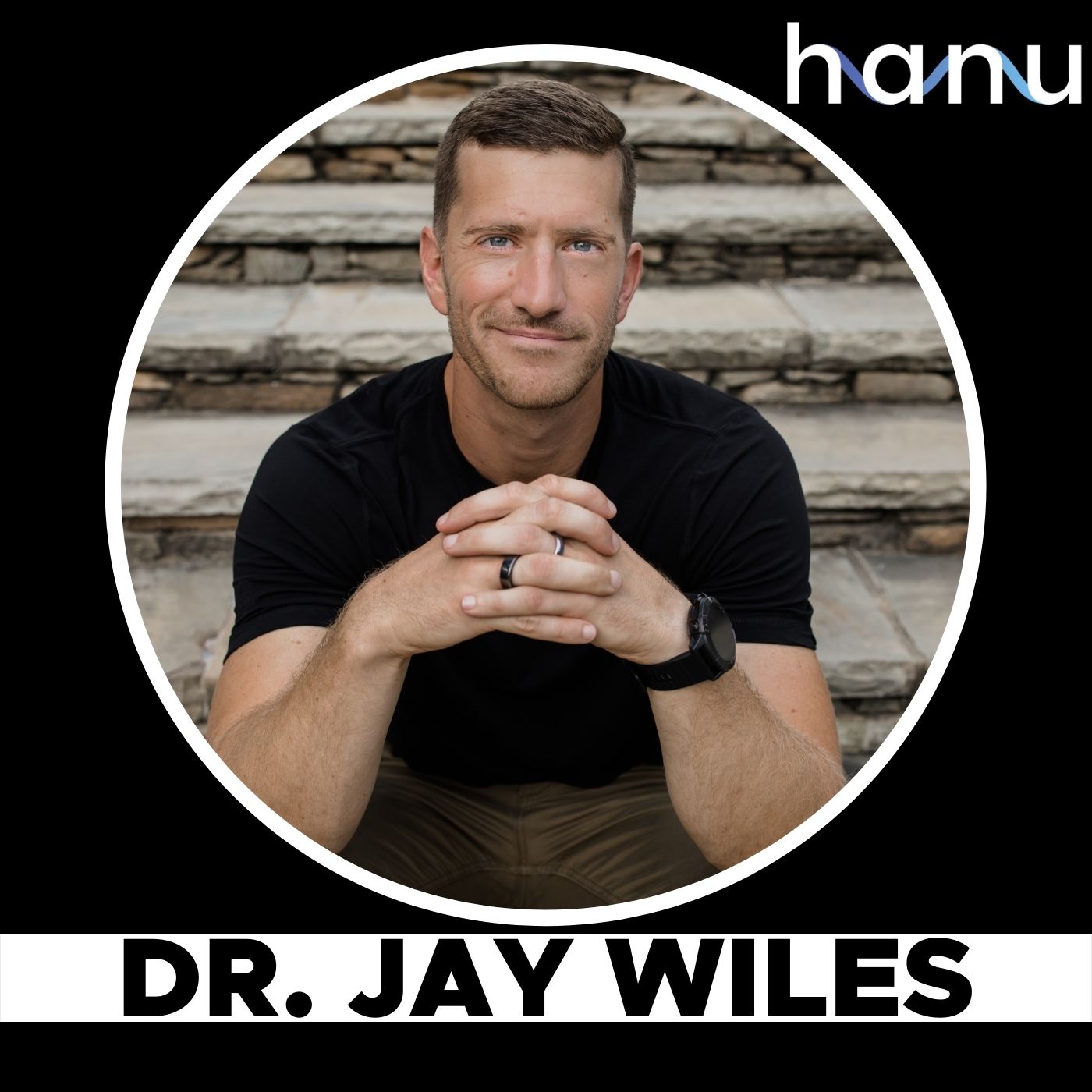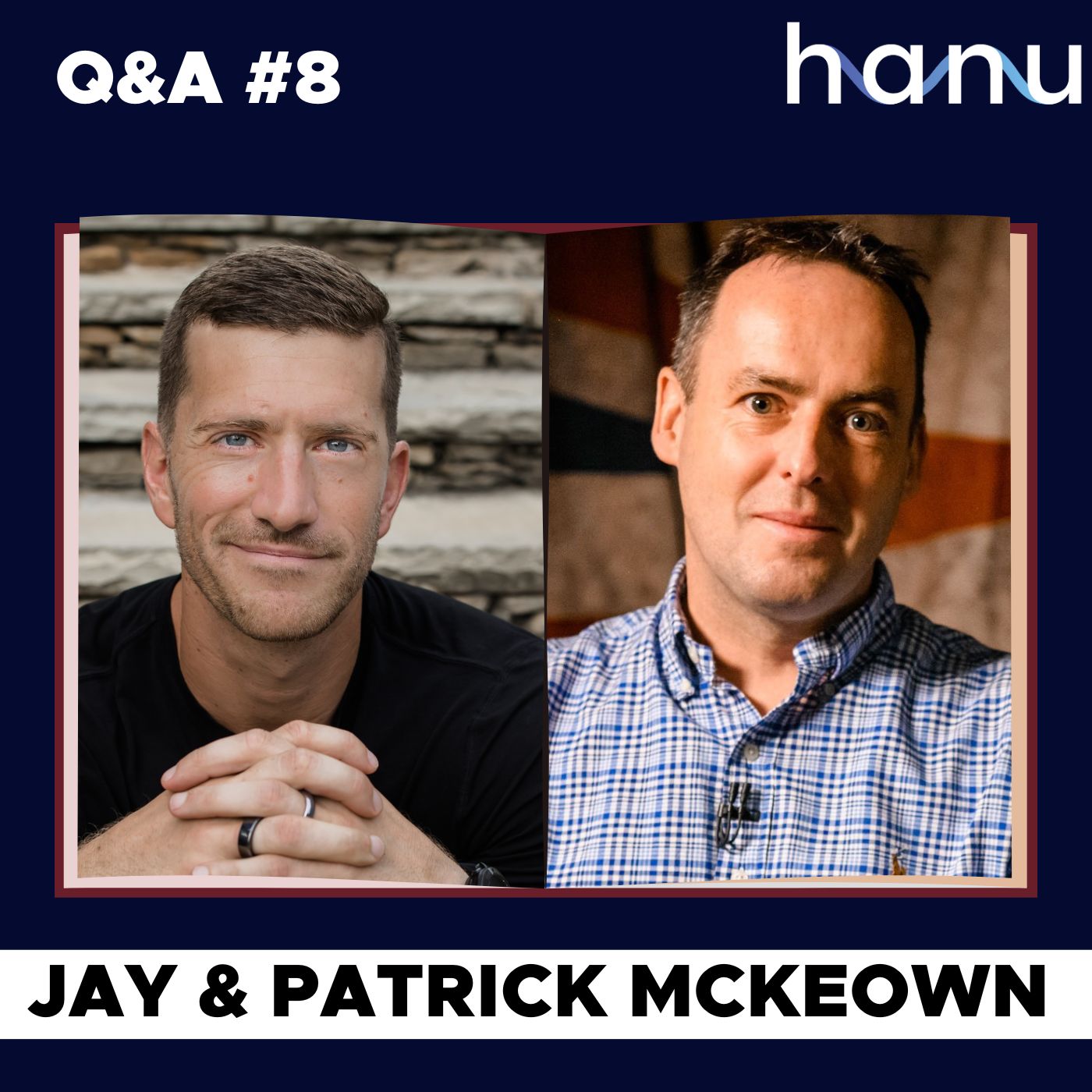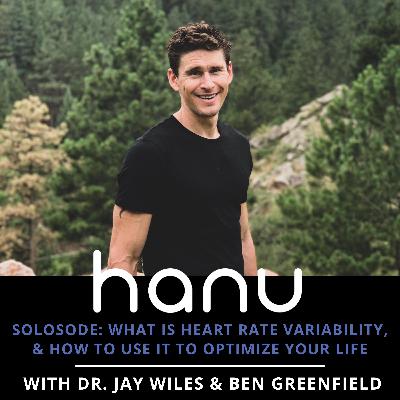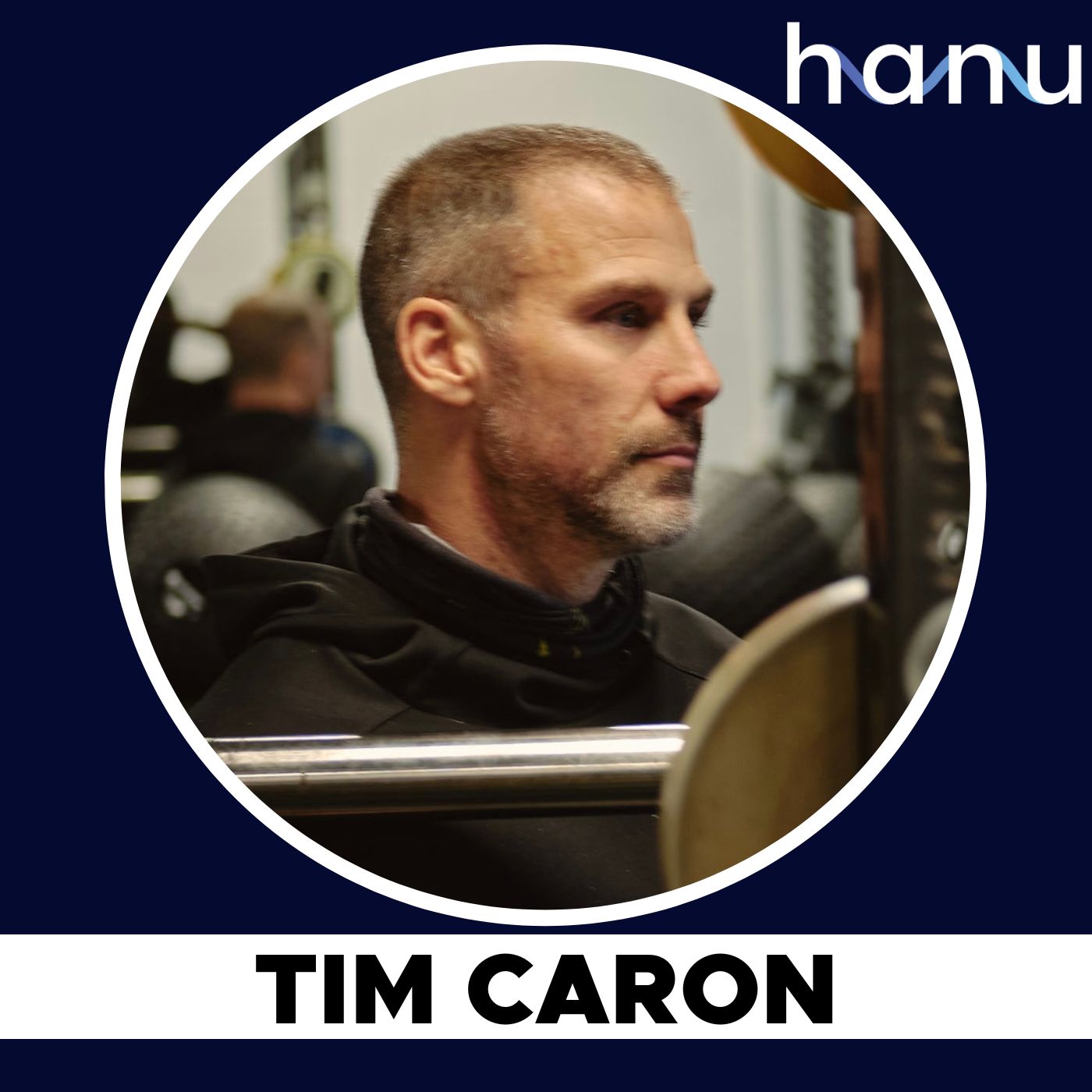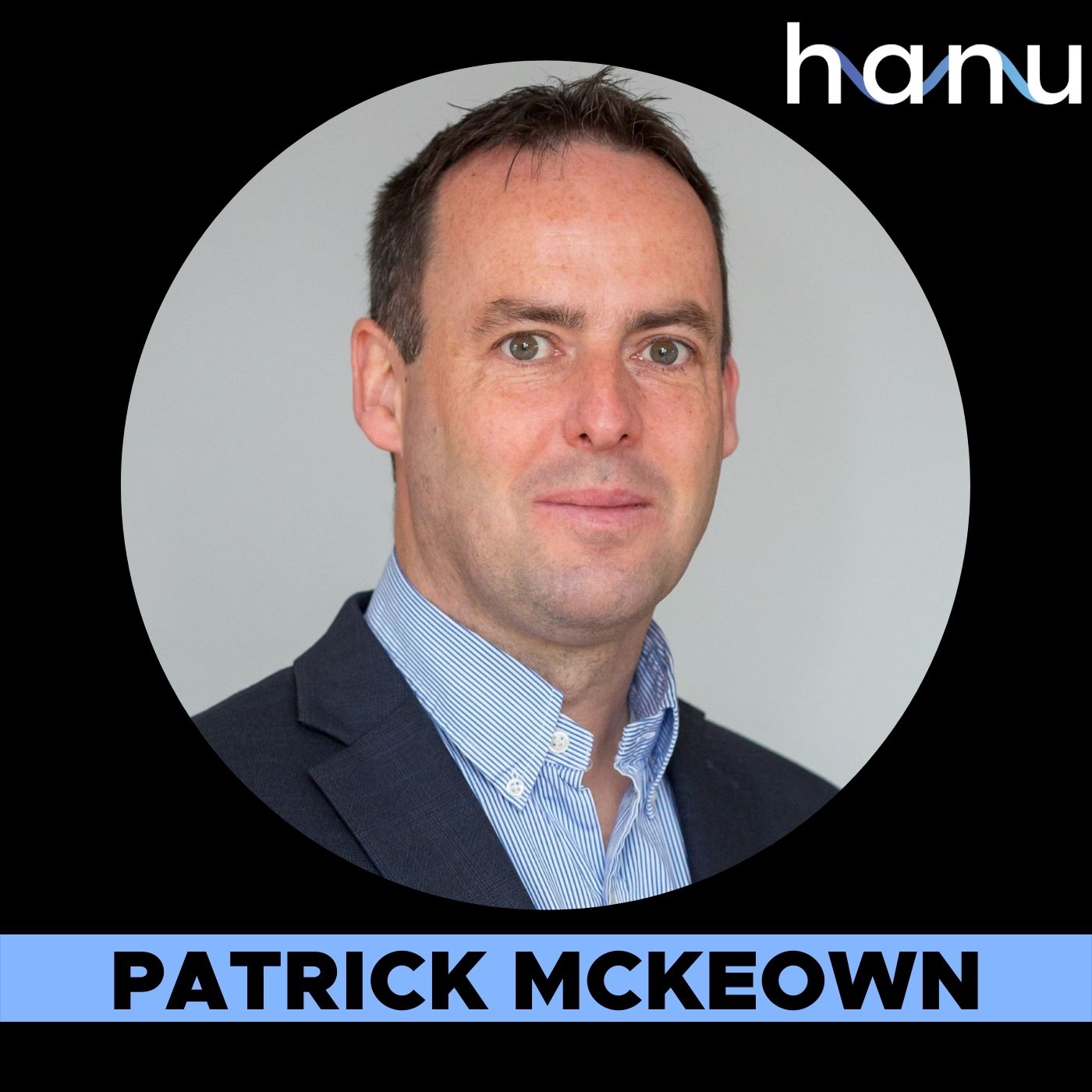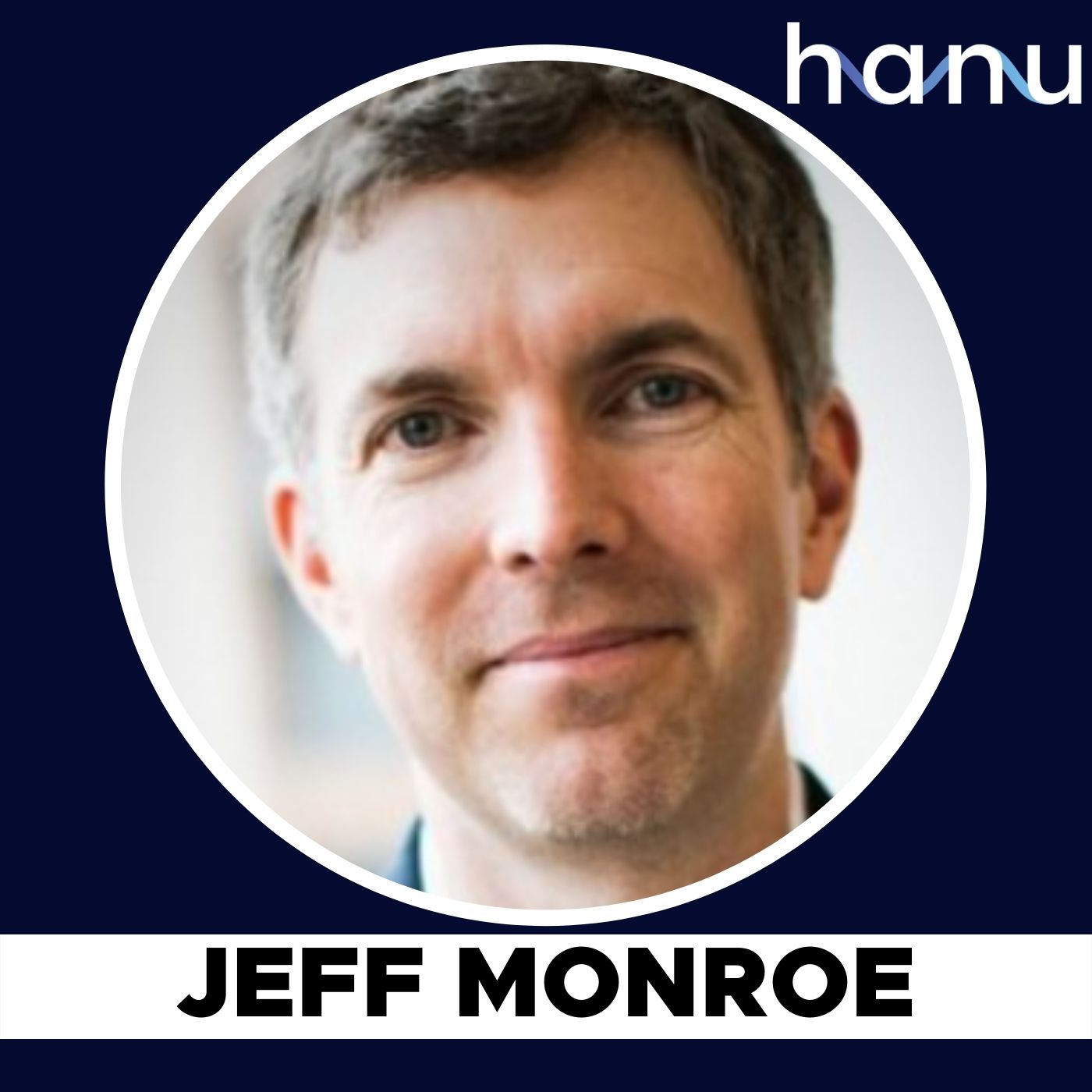Discover Hanu HRV
Hanu HRV

Hanu HRV
Author: HanuHRV (owned by Hanu Health, Inc)
Subscribed: 31Played: 941Subscribe
Share
© Copyright 2024 HanuHRV (owned by Hanu Health, Inc)
Description
The Hanu HRV Podcast is dedicated to providing education and practical solutions for enhancing your stress resilience. We believe that everyone has the innate ability to identify, use, and overcome stress. Dr. Jay T. Wiles, an international expert in psychophysiology, the human stress response, and heart rate variability, hosts the show with a unique integration of psychology, physiology, and therapeutics. He interviews diverse industry and scientific leaders and pioneers in helping others to improve their resilience to stress.
46 Episodes
Reverse
We are joined by renowned psychologist and host of the Your Life in Process podcast, Dr. Diana Hill. Listen in as she unpack's new an innovative ways to enhance emotional wellness though the practice of acceptance.In this episode, you'll learn:-The number one tip for becoming more aware and focused in daily living....01:10-Becoming comfortable with discomfort through acceptance...04:20-Why do we go on autopilot and how does it impact emotional health?...10:02-Meditation as a stressor and what do about it.....13:00-Why self-compassion is key to emotional and mental health....17:20-What is psychological flexibility and how can becoming more psychologically flexible benefit your mental health?....32:34-Why is acceptance one of the, if not the, most important skill for emotional wellness?...46:10-Must we accept everything or can this turn into denial?...50:27-Should we be thinking "happy thoughts?"....57:59-The necessity for daily reflection and journaling...1:03:24Resources mentioned:Your Life in Process PodcastDr. Diana's ACT Daily Journal
Dr. Ben Rein, a Stanford University neuroscientist and social media phenom, joins the Hanu Health podcast to discuss the intersection between neuroscience and mental health.In this episode, you'll learn:-The funny coincidence of names as it relates to professions....00:00-How Dr. Ben manages stress as a neuroscientist with a busy schedule....05:15-Why cramming and "all-nighters" lead to less productivity....08:32-Dr. Ben's go-to and science-backed stress mitigation techniques....13:07-Why Dr. Ben started posting on social media and how he uses it to advance the field of neuroscience...20:02-Dr. Ben's take on misinformation as it relates to science in social media...28:45-What is empathy?....44:45-Is there a way to increase empathy?...50:45-What is Dr. Ben most excited about in the advancement of neuroscience?....1:07:25-And much more!Resources mentioned:Dr. Ben's WebsiteDr. Ben's Tik TokDr. Ben's Instagram
In this week's episode, we have an enlightening chat with psychologist Dr. Carissa Gustafson about using acceptance and commitment therapy (ACT) to get a handle on anxiety. Dr. Gustafson provides valuable insights on how a sense of lacking control can drive anxiety. She explains how ACT helps you accept what you can and can't control, and take action focused on the present moment. We also dive into powerful ACT concepts like mindfulness, cognitive defusion, and connecting behaviors to your core values. Dr. Gustafson emphasizes embracing all your experiences with compassion as opposed to avoiding difficult emotions. She shares extremely practical techniques to become more flexible and committed to the meaningful life you want. Get ready to learn research-backed tools to develop self-awareness, acceptance, and take value-aligned action when anxiety strikes! Some amazing highlights from our chat:2:30 - Dr. Gustafson explains how anxiety arises from wanting control to feel safe. She emphasizes accepting what you can and can't control.7:55 - How mindfulness helps relate to thoughts and feelings with open awareness rather than avoidance.13:40 - Dr. Gustafson talks about using cognitive defusion to become unstuck from anxious thoughts. She suggests thanking your mind for trying to protect you.21:15 - Dr. Jay asks about linking behaviors to values to enhance motivation for change. Dr. Gustafson agrees this is key.31:20 - Dr. Gustafson stresses embracing all experiences, even difficult emotions, with self-compassion rather than judgment.Buy Dr. Carissa's book Reclaim Your Life: Acceptance and Commitment Therapy in 7 Weeks on her website or Amazon.
In this podcast, I challenge the misconception that health professionals are immune to their own struggles. As a psychologist and co-founder of Hanu, I share my experiences with emotional stress and anxiety to show that anyone can face these challenges. It's time to prioritize mental health as a crucial foundation of our wellness plans.During the podcast, I discuss the power of mindfulness and being present in the moment. Breathing exercises are essential for embracing our emotional experiences. Additionally, I share my fitness routine, which includes Zone 2 and Zone 5 training for cardiorespiratory fitness. Join me on this journey to prioritize our mental health and embrace well-being through mindfulness, exercise, and other important aspects.0:00:00"Exploring Mental Health Struggles as a Mental Health Practitioner"0:03:08"The Importance of Mental and Emotional Health: My Personal Struggles and What I'm Doing About It"0:05:30Exploring Mental Health: My Journey of Self-Awareness and Self-Regulation0:10:50Exploring the Emotional Rollercoaster of Stress and Anxiety0:13:09Exploring My Journey to Mental Health Wellness0:14:47Exploring the Benefits of Mental Health Therapy Modalities0:16:54Heading: Exploring the Pros and Cons of Cognitive Behavioral Therapy (CBT)0:19:30Exploring Values-Driven Living: A Conversation on Emotional Awareness and Acceptance0:22:01Exploring Mindfulness and Diffusion Techniques for Anxiety Management0:23:51Exploring Mental and Emotional Health Through ACT and Exercise0:25:48Training for Improved Cardiovascular Fitness: A Discussion on Zone Two, Zone Five, and Vo2 Max Interval Training0:28:29Heading: The Benefits of Exercise and Nutrition for Mental and Physical Health0:30:12The Benefits of Optimizing Sleep and Autonomic Nervous System Regulation Through Diet, Exercise, and Mindfulness Practices0:39:37Exploring Emotional Wellness: A Discussion on Meditation, Hanu, and Walking as Tools for Self-Care0:41:24Exploring the Power of Accountability and Relationships for Mental Health0:46:23"The Benefits of Emotional Mental Health: A Conversation with Hanu Health"
We are back and we are back with an offering unlike anything we have every provided at Hanu! After many requests, Dr. Wiles is back in action in his role as a consultant and a coach! Tun in to learn all of the benefits of having Dr. Wiles as your coach, including how he can develop a tailored and personalized roadmap for enhancing your mental wellness, all powered by science and evidenced-based practices!Your mental health is important. It is time to partner with someone and Hanu wants to partner with you. Stop letting mental health problems like stress, anxiety, and depression lead you down a path of destruction. In this episode, you'll learn:-New offerings at Hanu, including the Hanu Certified Coaching Program; use code HCC500 for $500 off-Updates to the Hanu Stress Resiliency Score Algorithm -Introduction to the Hanu Consulting Platform-Who is Hanu Consulting for?-What are Dr. Jay's prior experiences and success stories?-How does the Hanu Consulting process work?-What is the goal of Hanu coaching?-How to get signed up at www.hanuhealth.com/consulting (limited spots)
The one thing that I've really wanted out of my podcast, but also just in general, is a lot more powerful female voices in the fields of health and wellness, performance, and biohacking. So when I had the opportunity to participate in a roundtable podcast, I immediately knew three incredible women who would make for a really good, well-rounded discussion.Mental health, wellbeing and stress impacts both males and females. But in the health and wellness community, a lot of the time the strategies and therapeutics are more pointed towards males. So for me, this episode scratches my own itch because conversations like these are such an underserved thing in our community.Let's meet our esteemed guests on today's Roundtable Podcast.Renee Belz and Lauren Sambataro - The Biohacker Babes PodcastMollie McGlocklin - Sleep Is a Skill PodcastIn this episode, you'll learn:-How Mollie structures her sleep architecture...02:31-Consistency vs Accuracy of sleep trackers...05:42-How Dr. Jay digests his sleep data...07:21-What trackers DO measure well...08:24-Renee’s advice if you’re not a crazy Biohacker!...10:36-Dr. Jay’s data routine...13:15-Renee’s advice & experience with REM...18:27-Can we shift our REM stages in the night?...23:01-Empower Sleep Ring for Sleep Apnea...26:03-Lauren’s ‘home sleep study’ & Alarm clock hack...30:02-Sleep Coaching with Whoop...33:37-Why we need consistent sleep/wake times...34:25-What Dr. Jay does to get back on track...40:01-Mollie’s sleep anxiety & “Do Nothing Method”...43:43-Renee’s biggest sleep struggle...46:22-Lauren’s preference with week to weekend sleep...47:48-Mollie’s “Circadian-crafted Day” and “Summer Hours”...49:20-Dr. Jay’s non-negotiable...51:25-Mollie’s personal sleep challenges & hacks...52:50-STUDY about Sheets...57:02-Renee’s travel sleep hacks...58:31
Jay Wiles and Patrick McKeown join forces once again to discuss the importance of self-awareness on stress relief and much more, including answering some listener questions!In this episode, you'll learn:-Discussion on stoic philosophy, Marcus Aurelius, etc...03:12-Resilience related to cognition and physiology...09:14-Lifelong learning, embracing new ways of viewing the world and one's craft...17:16-Tips on managing HRV and doing breath work while traveling...23:15-Entertaining worst-case scenarios only extends our pain and suffering...36:13-Listener Question #1: Natural pace vs. regimentation when it comes to breathwork...38:12-Listener Question #2: Alternate nostril breathing pros and cons...50:25-Listener Question #3: Is meditation or breathwork a better starting point for improving mental health?...1:10:40-And much more!Resources mentioned:The Obstacle Is the Way by Ryan HolidayThink Again by Adam GrantBreathe Right protocol
The very act of recording this podcast was...interesting. Four separate attempts, and an entire hour consumed before I could get the product I wanted to share with you.Frustrating as it was due to factors I won't get into here, I realized it's very much like the process of developing our Hanu wearable, (which you can buy at a massive 40% discount when you use discount code POD40 at checkout.)In this episode, I share the essential product development factors that the Hanu team and I have taken from Day 1. Bottom line is if your life isn't improved by using the product, all the data in the world won't do you a lick of good.I'll just leave it at that. Enjoy this short "walk and talk" episode!In this episode, you'll learn:-The roadmap of developing an advanced tech product like the Hanu wearable...05:55-Hanu is not an HRV company; HRV is the mechanism by which we measure the efficacy of the product...08:05-Direction is the most valuable component of the Hanu mission (how to get from Point A to Point B)...11:30-Data vs. outcomes in measuring the efficacy of the product, not to mention the quality of your life...13:20-Changing psychology before changing physiology...16:40-And more!Resources mentioned:Go to hanuhealth.com and use discount code POD40 for a fat 40% discount off the retail price. This offer is literally days away from being taken off the table, so if you're going to buy it, now's the time!
Why is real change so dang difficult? In this episode, Dr. Jay reveals a few personal struggles he's dealt with in his own life, and shares the stages of change, as well as practicable tips on enacting real and lasting change in your own behavior.In this episode, you'll learn:-How a psychologist found his true calling in the realm of fitness and behavior change...06:30-Dr. Jay visits the confession booth regarding his behavior and lifestyle from childhood to the present...12:20-Why real and permanent change is so difficult...21:03Internal locus of control is the key to personal accountability and ownership of your actions-The stages of change...27:25Pre-contemplationContemplationPreparationActionMaintenance(Relapse)-Commentary on "SMART" goals...34:45SpecificMeasurableActionableRealisticTimely-Cultivating a mindset of eschewing inaction...39:32-Steps to transitioning from a fixed mindset to a growth mindset...47:21Atomic Habits by James ClearAlways link goals with your values and aspirationsCombine behaviors with things you always do (K.I.S.S.)Establish a reward system for achieving your goalsAccountability enhances the success of behavior change by up to 42%-Education without action is meaningless...1:01:17Resources mentioned:-Atomic Habits by James Clear-The Hanu wearable. Use code POD40 to receive the wearable and one year of membership for 40% off the retail price of $299!
This episode is near and dear to my heart, for it fulfills a long-seated desire I've had when I got into the podcasting game years and years ago.The one thing that I've really wanted out of my podcast, but also just in general, is a lot more powerful female voices in the fields of health and wellness, performance, and biohacking. So when I had the opportunity to participate in a roundtable podcast, I immediately knew three incredible women who would make for a really good, well-rounded discussion.Mental health, wellbeing and stress impacts both males and females. But in the health and wellness community, a lot of the time the strategies and therapeutics are more pointed towards males. So for me, this episode scratches my own itch because conversations like these are such an underserved thing in our community.Let's meet our esteemed guests on today's Roundtable Podcast - the first of what we hope will be many such podcasts in the future!Renee Belz and Lauren Sambataro - The Biohacker Babes PodcastMollie McGlocklin - Sleep Is a Skill PodcastIn this episode, you'll learn:Deep Question #1: What did you eat for breakfast today?...10:30The importance of rotating foods in and out of the diet...16:16Differing viewpoints on mealtimes and eating patterns...24:40The ideal time to break your fast each day...36:12Listener question: Pros and cons of using mouth-tape while sleeping...48:30The folly of mindlessly copying your favorite health and fitness influencer for personal health decisions...57:40And much more!Resources mentioned:Levels HealthHanu HealthThe Biohacker Babes PodcastSleep Is a Skill Podcast Ben Greenfield Life PodcastViomeDr. Satchin PandaDr. Thomas DeLauerPatrick McKeownMyotapeOtter.ai transcription software
Welcome back to another episode of the Hano health podcast. I got another special one for you, and I don't mean to bombard you with all things, Ben Greenfield, but this is two weeks in a row that we wanted to release some content from Ben Greenfield.Now it's not actually an interview with Ben Greenfield. It's actually me on Ben Greenfield's podcast. So if you're a follower of Ben Greenfield, you might have heard this one, but if not, you'll get the special opportunity to hear me being interviewed by Ben Greenfield on his podcast about all things HRV and Hanu. Now this was a really special occasion for me as a podcaster, as a friend of Ben's. And the reason it was so special is because obviously we wanted to show Ben and his audience the world of Hanu. But one thing that I loved about this podcast that you will find really interesting is because Ben from the very beginning of the podcast has the Hanu strap on, he's got his app open and we walk through a lot of the features within the application. So he asked me questions on what he's seeing, why his data is doing what it's doing, etc. And I was able to provide an in-depth explanation of what's going with the app and device in real time.We walk through many of the different features, like the resonance frequency assessment that you get to do making sure that you're tracking things like bolt score, doing all of these beautiful practices.We talk about this idea of snapshot, which is like a testing feature morning readiness reading feature. All of the goodies are in there. So Ben and I unpack it all in this podcast so that I hope that you really enjoy this one because it was a blast for me to do and to be able to share with Ben's audience.And I'm very grateful that Ben said to go ahead and share it with the Hanu audience as well. So if you've already listened to the podcast, yes, it's the one that I did withBen recently. But if you haven't listened to it, here's your opportunity to do it and to support Hanu while you do it by listening on our podcast, couple other ways that you can help support the podcast.Then you can write to us: podcast@hanuhealth.com and we will send you a Hanu Health goody pack full of amazing Hanu and oxygen advantage gear. I hope that you really enjoy this podcast episode that I did with the one and only Ben Greenfield on his podcast. He's wearing this thing, telling you about what he sees and you will be able to experience this yourself soon.In this episode, you'll learn:-What does “Hanu” mean?…03:50Hanu a Hawaiian word that means breath-Jay's personal journey to becoming an expert in HRV…05:15Specialized in “health psychology”“Demoralization”: learned helplessness and hopelessnessChronic ailments can be traced to demoralizationBiofeedback training with military veterans produced noticeable improvements in health and well-being-How is the Hanu wearable different from other devices that track HRV?…11:46Measurement in most wearables is very standardizedLooking at HRV continuously, all day longAlerts when there are dramatic changes in HRV “Life Events”“Super compensation”Uses same algorithms as devices like Oura RingHanu Health PodcastPodcast with Dr. Jay Wiles:A Deep Dive Into HRV: How To Use Heart Rate Variability To Optimize Your Sleep, Stress, Recovery, Performance, Nervous System Balance & Much More!-What causes HRV...
This is a podcast that I recorded about two years ago for Ben Greenfield. It's a solosode that I did for him all on HRV. Now this podcast is so incredibly dense and long. We're talking about a deep dive into all things, HRV. We're going to talk about all the different metrics of HRV. We're going to get into depth in terms of psychophysiology, what produces HRV.There are a couple caveats before we jump into this podcast. There are some things that I've changed my mind on. I recorded this two years ago, and guess what? The science changes and let me explain the two things. Number one is I provide an entire section on normative ranges. I'm actually going to give you permission to skip it. The reason is because I am coming more and more to the conclusion that those normative range bases that I presented are just there as a novelty. They're just there as something that if you're curious, you've got it. Remember we're supposed to only self compare as opposed to normatively compare, but I spend a really long time talking about these normative comparisons and providing frameworks for those based on age among other things.You can listen to it, but feel free to skip it. If you already know that it's basically pointless to compare yourself normatively, but if you're interested in where you fall by all means like, go for it. The second thing is that I utilize the term autonomic balance or HRV balance a lot in this podcast. The science has already has also concluded that terminology probably isn't the best terminology. On one hand, you can say yes, there is a level of autonomic balance that happens. But on the other hand, that's way more of an oversimplification of what actually happens. What I want you to framework this in, when you hear it on the podcast, is that we should think about our nervous system and HRV in terms of double footed driving. Whereas we don't want just have a foot on the gas pedal, which is the sympathetic nervous system, and then we slam on the brakes. We can actually drive with both feet and modulate those. And the point is not to engage in balance. I always come back to the whole point of HRV biofeedback and training is to train autonomic control.You can tell your sympathetic nervous system what you want to do with it at any given time, as well as your parasympathetic nervous system that comes from training. That's why we created Hanu. It's why you have this system, hopefully in your hands, or you're using it right now is because it is intended to train autonomic control.So those are the two key points that I wanted to mention. Again, I'm excited to be able to bring you this really deep dive. And I have another podcast coming from the Ben Greenfield podcast that's all about, Hanu. Not just a deep dive in HRV, but Ben actually asks me all about Hanu, the company and mission. So be on the lookout for that one coming very soon.Last thing before we jump in, just to remind you, if you have already pre-ordered, it's time for you to complete that order. So look out for that email so you can complete it and we can send it to you in August. And also too, if you want to be a pre-order customer and get your device in August, use coupon code POD40. That will take the price from $299 down to a $180. And then after that, it only costs you $12 per month. In this episode, you'll hear:-Jay's background and a brief overview of “biofeedback”…7:16-Research on the use of HRV as a metric and HRV Biofeedback…11:43-Overview of Psychophysiology…18:46-What Is Heart Rate Variability…39:55-Metrics of Heart Rate Variability…49:19-HRV Norms…1:12:00-HRV Training/Regulation…1:23:45-HRV Hacks…1:42:00–a...
In today's episode, Dr. Jay gives an in-depth analysis of a scholarly article recently published discussing the effects of chronic stress on longevity as well as genetic structure.Also, since we've received so many questions about how the Hanu device actually works, Jay gives a detailed breakdown of his daily routine with the device.Remember, you can still pre-order the Hanu wearable at the special 40% discount - but this will go away sooner than you know, so tarry at your own risk!Click here to learn more about and pre-order the device.In this episode, you'll learn:-An update on the release of the Hanu Health heart-rate measurement device...02:00-Chronic stress deleteriously affects gene expression...08:15-Enhance emotional resilience and self-control...24:00-How Dr. Jay uses the Hanu device on a daily basis...30:00-Priming the nervous system to best digest food...52:23-And much more...Resources mentioned:-Hanu Health device pre-order: Get 40% off the Hanu device when you use code "POD40"-Psychological and biological resilience modulates the effects of stress on epigenetic aging
The Hanu Health wearable is now live for our alpha testers! Today's Q&A episode is dedicated to answering our tester's questions about Hanu, the system, and what we have planned to better your lifestyle!In this episode, you'll learn:-What is the purpose and features of the Hanu wearable?...04:10-Why does my HRV go down while doing box breathing exercises?...17:42-Why does my HRV fluctuate throughout the day?...33:22-What will signify a push-alert and a "life notification" on the Hanu wearable device?...47:22-And much more!Resources mentioned:The Hanu wearable is now available for our Alpha testers! Head on over to hanuhealth.com to claim yours as soon as it's available at the next phase of distribution. Use coupon code POD40 to get 40% off your device! (Available for a limited time.)
Jay Wiles and Patrick McKeown join forces once again to discuss the importance of self-awareness on stress relief and much more, including answering some listener questions!In this episode, you'll learn:-Why competition for our time adds hidden stress to our lives...02:30-The biggest factors that affect HRV...05:56-Why neglect of physiology may be affecting your leadership abilities deleteriously...12:58-How breathing relates to recovery from trauma...26:01Listener Q&A-Thoughts on The Physiological Sigh...34:00-Can a person with cystic fibrosis or other lung issues perform the same breath exercises for managing stress levels?...52:18-Tips on breathwork to deal with focus and attention deficit issues...1:02:34What are you waiting for? Join the Hanu Health wait list today to be kept in the loop about our upcoming product launches. We think you'll agree it will be worth the wait!Join here.
Tim Caron is co-founder of Allegiate Gym, vreator of the pH Podcast, and author of Strength Deficit: Leveraging Ratios Between Eccentric and Concentric Strength. He has Masters Degrees in Strength and Conditioning from Springfield College and Cal U of Pennsylvania, along with two bachelors degrees in Mathematics and Movement Science from Westfield State University.His professional career includes Head Strength and Conditioning Coach at Army West Point, Associate Strength and Conditioning Coach at University of Southern California, Assistant Strength and Conditioning Coach at Georgia Tech, and Assistant Strength and Conditioning Coach at Springfield College.In this episode, you'll learn:-How Tim took care of himself in mind and body while writing his book...01:55-What Tim means when he uses the term "Strength Deficit"...12:22-The best way to identify strength deficits...22:42-Data biometrics to measure: HRV, resting heart rate, etc...40:25-How this info translates to the general population, or is this just for high performers?...52:43-Prioritize sleep for optimal recovery...57:48-And much more...Resources mentioned:phpodcast.comallegiategym.comGuest's social handles:Instagram: @coachtimcaron @performancehealthpodcast
Lauren and Renee grew up in a health-driven family that prioritized the fundamentals of wellness and self-care (don’t worry, there was lots of mac n’ cheese and peanut butter and jelly sandwiches!). Their father, Gene Sambataro, The Original Biohacker and pioneer of Holistic Dentistry, taught them the importance of individualization and experimentation from a very young age.Coming together as health entrepreneurs, Renee a Certified Nutritional Consultant and Holistic Lifestyle Coach with a Master’s degree in Nutrition, and Lauren, a Broadway performer, Corrective Exercise specialist and Functional Health Coach, feel a strong passion and drive to not only share each of their journeys towards wellness, but their strategy and motivation to discover our unique bodies through the world of biohacking.Their podcast, the Biohacker Babes, aims to create insight into the body’s natural healing abilities, strengthen your intuition, and empower you with techniques and modalities to optimize your health and wellness.In this episode, you'll learn:-How Lauren and Renee got interested in health and fitness, and biohacking...04:45-Expanding conventional thinking regarding biohacking...10:20-How Lauren and Renee define biohacking...13:55-Nutritional input for women in all stages of life...20:15-Fasting tips for women...27:00-The myth of "accidental muscle"...37:33-The gals discuss their exercise regimens...40:35-Dad's "biohacking lab"...47:12-Benefits of Zone 2 training...51:11-Sleep hacks...56:04-How to track sleep...1:02:33-How the biohacker babes deal with stress...1:07:10Resources mentioned:Lauren and Renee's websiteOura RingKion SleepOthership appGuest's Instagram handles:@Biohacker_Babes@Lauren_Sambataro@ReneeBelz
Jay Wiles and Patrick McKeown join forces once again to discuss the importance of self-awareness on stress relief and much more, including answering some listener questions!In this episode, you'll learn:-Focusing on the response to, not eliminating, stress...05:04-Self-awareness defined...14:14-Question #1: Daniel asks: Is it normal to have increased anxiety when performing breathwork for anxiety and panicking? What do I do to combat that?...21:25-Question #2: Angie asks: I've heard Patrick talk about a shift in the oxyhemoglobin disassociation curve. What is it and how do we use it?...41:18-Question #3: Tim asks: I am training for a triathlon and find breathing while swimming quite difficult. I have tried breathing only through my nose but it seems almost impossible. Have you ever seen or heard of any nasal swimmers? Also, will helping my CO2 tolerance help me with the swim portion?...55:02-And much more...Resources mentioned:Hanu Health
HAELO, the only pulsed electromagnetic field therapy (PEMF) device that is designed to mimic Earth’s symphony of frequencies. PEMF is a safe technology that emits sound frequencies to replenish cellular health. No matter what challenges you’re ready to tackle, HAELO will enhance your life and help you succeed.In this episode, you'll learn:-What is PEMF?...02:30-How PEMF works at a physiological level...10:00-Studies on the depolarization of cells with PEMF...15:30-PEMF and grounding with the earth contrasted...18:45-Playing the long game using a PEMF centric device...29:07-Brass tacks functional uses of the HAELO device...34:30-How athletes use PEMF...44:20-How HAELO is different from other PEMF devices...50:30-And much more...Resources mentioned:HAELO WebsiteHAELO FacebookHAELO InstagramHAELO Twitter
"Mr. Gorbachev, unstress this mess." -Ronald ReaganOf course President Reagan said, "Tear down this wall" in his famous speech around the fall of the Iron Curtain in the late 1980's. But a lifestyle laden with unhealthy stress can be our own personal "wall of oppression" if we don't address it wisely and with intention.In this episode, host Jay Wiles lays down his own routines and hacks to "destress" his life and how you can too. Enjoy!In this episode, you'll learn:-You can pre-order the most complete stress resiliency operating system known to man...03:3040% discount$29 down now, fully refundable$150 value gift box if you are one of the first 1,000 to pre-orderEntered to win a one hour one-on-one coaching with Ben Greenfield from our advisory team and Ben Greenfield FitnessPre-order here!-Dr. Jay's top 5 daily habits for destressing...07:30-1. Exercise is SO important for stress resilience...08:15Start your day with a walk in the sun.Good, quality resistance training. Anything that helps build strength.The Muscle Intelligence podcast hosted by Ben Pakulski. (check spelling)Zone 2 cardio training. (45 min to an hour, 4-5 days per week)Zone 2 Training Podcast with Iñigo San-Millán, Ph.D. & Peter Attia, M.D.Walking, in general, is an extremely effective means to adapt to stress.Dr. Wiles aims for 8,000-10,000 steps per day.-2. Elemental stressors...18:00Sauna: 220 degrees for 20 minutes, 6 days per week.Elemental stressors build a more effective nervous system.Breathing exercises in the sauna.Cold exposure 6 days per week.3 minutes in an ice cold shower, keep the body moving.Aim for at least 3 times per week of hot and cold exposures.-3. Quality personal time with loved ones...24:10Good quality social engagement is one of the top things for mental health and well-being.Find time for connectedness.-4. Focused nutrition and focused fasting...26:45Dr. Wiles intermittent fasts every single day. Generally, stops eating around 6 or 7 p.m. at night, does not eat again until 12 or 1 p.m. the following day. Benefits mental acuity, positive biometric changes, and stress reduction.Occasionally takes on an extended fast: 24, 48 or even 72 hours.Quality food that does not produce excessive inflammation. Avoid highly refined sugar.Focus on whole foods, foods that makes you feel good. Focus on the quantity of food. -5. Breathwork and HRV biofeedback...37:305-10 minutes of resonance breathing every day.Focused breathing periodically throughout the day.Wind down after workouts: 2-5 minutes of down-regulating breathwork.HRV biofeedback is a go-to practice.-Honorable mentions...43:30Focus on good quality sleepLight therapy all day longGreat water and mineralizationSupplementationResources mentioned: Dr. Nathan Bryan On the Effects of Nitric Oxide on Physical Performance podcast episodeDr. Jay's Daily Routine podcast episode






